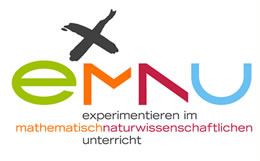Einzelprojekte
Accompanying doctoral programme
We have designed an accompanying doctoral programme which covers the areas of scientific discipline, subject didactic and research methodology. This academic programme is for the benefit of our graduate students to ensure an excellent quality of the dissertations.
The concerted approach of our academic programme promotes a homogeneous balance between fundamentals and standards which are applied by the scholarship holders during different individual projects. Our graduate students are seamlessly assisted in each phase of their studies since the various elements and contents of the programme are optimally coordinated. In this way, a significant foundation is created which promotes high quality scientific results. They represent the systematic strength of our academic programme and are advantageous for the consortium of professors from the different universities.
1. Initial workshops on subject didactics and research methods
At the beginning of the doctoral programme, the graduate students participate in a two week workshop in order to form a basis for scientific work. The workshops also serve to foster a high degree of transparency in the interests and competences of the members as well as to support their current projects through cooperation and exchange of information.
Kick-off workshop 1: a two day workshop on subject didactics (the main emphasis is on experiments in math and science), competence development and evaluation (implemented by experts in the areas of math and scientific didactics).
Kick-off workshop 2: a three-day workshop about the phases of the research process (designed in the cross curricular project ‘Method Centre’). The content of the workshop covers in particular the aspects of project planning, choice of design, drawing samples, assessment methods, evaluation strategies and methods, standards for scientific publications and result distribution.
2. Regular educational conferences and workshops
Learning and development of competences in the field of scientific research require a solid basis in our graduate students’ education. Regular educational conferences and workshops are implemented to ensure high quality scholarship. The educational conferences and seminar specific offerings are conceptualised at each individual University. Full day and longer workshops are offered at all participating Universities.
Recurring collegiate meetings facilitate and guarantee the exchange of well structured information about ongoing projects. This also helps to establish maximum internal communication among the doctoral programme members.
Workshops at the participating Universities
The various workshops offered are organised into blocks lasting one or more days. This timeframe makes it possible for all graduate students to participate. The workshops serve to obtain the following major goals: the introduction and discussion of results and findings by scholarship holders and their tutors, to guide the further research processes and/or to transfer knowledge about relevant educational content in a compact form.
Workshops about research processes take place during two annual events at varying locations lasting one or two days. Graduate students present their results and insights. Moreover, the further research process is coordinated.
The workshops with education relevant content and competences (e.g. subject didactic and research methods) can draw partly on materials from existing modules for doctoral studies at the different educational Universities. These existing modules include the Winter Academy within the framework of the graduate school “Competences in Research and Teaching” and as of the winter semester 2007/2008 the course work for the achievement of the University certificate “Evaluation and Empirical Research Methods”.
The structure of the Winter Academy as well as consultation on subject matter and quality assurance of the various courses has been conducted in cooperation with different Universities including: the HDZ( Didactical centre of Universities from the state Baden-Wurttemberg), the Graduate Academy of the University Heidelberg, the Academy for Scientific Education at the University Heidelberg, the ESERA (European Science Education Research Association), the EARLI (European Association for Research in Learning and Instruction) and various other partner universities.
Courses to obtain the university certificate “Evaluation and Empiric Research Methods”
As of the winter semester 2007/8, a structured advanced educational curriculum, called “Evaluation and Empiric Research Methods”, was established by the Department of Research Methods (Head: Prof. Dr. Markus Wirtz) at the University of Education in Freiburg which imparts statistical and evaluation methods as well as quality assurance.
The various individual courses of the curriculum are organised into blocks of one or two days, which allows all graduate students to participate. The curriculum includes coursework in the basic aspects of empirical research methods, for example,
· Data ascertainment and construction of questionnaires,
· Introduction to SPSS
· Introduction to descriptive statistical methods
as well as further statistical processes, such as:
· Introduction to regression and variance analysis using SPSS
· Introduction to factor analysis using SPSS
· Introduction to structural equation models using AMOS
· Introduction to multi level analysis using HLM,
· Introduction to Rasch analysis using Conquest or RUMM
· Introduction to latent class analysis using Latent Gold
Successful participation in at least five courses from the curriculum is awarded with the University certificate “Evaluation and Empirical Research Methods”. Each Scholar can choose the courses from the curriculum which are relevant for them.
University specific offerings
Each participating university offers specific supplementary courses at their campuses in addition to the programme curriculum. These university specific courses include:
· Graduate student colloquiums,
· Research seminars,
· Subject didactical seminars and
· Journal clubs.
The university specific offerings also involve the connection of ongoing research activities in its doctoral programme with the infrastructure of the participating universities and research communities as well as to structurally integrate the expertise of our academic advisers into the different course offerings of our doctoral programme.




